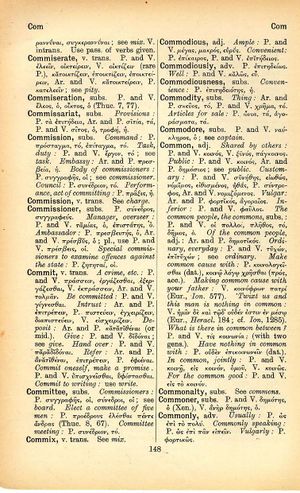common
Οὐ γὰρ ἀργίας ὤνιον ἡ ὑγίεια καὶ ἀπραξίας, ἅ γε δὴ μέγιστα κακῶν ταῖς νόσοις πρόσεστι, καὶ οὐδὲν διαφέρει τοῦ τὰ ὄμματα τῷ μὴ διαβλέπειν καὶ τὴν φωνὴν τῷ μὴ φθέγγεσθαι φυλάττοντος ὁ τὴν ὑγίειαν ἀχρηστίᾳ καὶ ἡσυχίᾳ σῴζειν οἰόμενος → For health is not to be purchased by idleness and inactivity, which are the greatest evils attendant on sickness, and the man who thinks to conserve his health by uselessness and ease does not differ from him who guards his eyes by not seeing, and his voice by not speaking
English > Greek (Woodhouse)
adj.
Shared by others: P. and V. κοινός, V. ξυνός, πάγκοινος.
Public: P. and V. κοινός, Ar. and P. δημόσιος; see public.
Customary: P. and V. συνήθης, εἰωθώς, νόμιμος, εἰθισμένος, ἠθάς, P. σύντροφος, Ar. and V. νομιζόμενος.
Vulgar: Ar. and P. φορτικός, ἀγοραῖος.
Inferior: P. and V. φαῦλος.
The common people, the commons, subs.: P. and V. οἱ πολλοί, πλῆθος, τό, δῆμος, ὁ.
Of the common people, adj.: Ar. and P. δημοτικός.
Ordinary, everyday: P. and V. τυχών, ἐπίτυχών; see ordinary.
Make common causewith: P. κοινολογεῖσθαι (dat.), κοινῷ λόγῳ χρῆσθαι (πρός, acc.).
Making common causewith your father: V. κοινόφρων πατρί (Eur., Ion. 577).
'Twixt us and this man is nothing in common: V. ἡμῖν δὲ καὶ τῷδʼ οὐδέν ἐστιν ἐν μέσῳ (Eur., Heracl. 184; cf. Ion, 1285).
What is there in common between? P. and V. τίς κοινωνία; (with two gens.).
Have nothing in common with: P. οὐδὲν ἐπικοινωνεῖν (dat.).
In common, jointly: P. and V. κοινῇ, εἰς κοινόν, ὁμοῦ, V. κοινῶς.
For the common good: P. and V. εἰς τὸ κοινόν.

